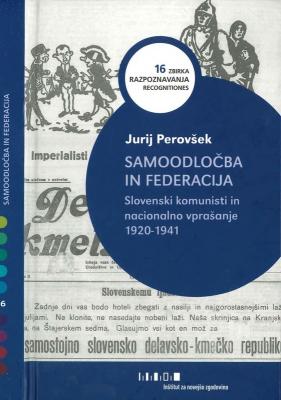Seif Determination and Federation: Slovenian Communists and the National Question 1920-1941
Keywords:
communist party, political ideas, Yugoslavia, SloveniaSynopsis
Initially Slovenian communists in the first Yugoslav state did not pay special attention to the national issues. Their views of this were formed in accordance with the standpoints of the Socialist Workers’ Party of Yugoslavia (the communists), and since 1920 the Communist Party of Yugoslavia (hereinafter KPJ). KPJ established its initial communist unitarian and centralist national Programme at the l st and 2nd congresses, which, respectively, took place between 21 and 23 April 1919 in Beigrade and between 20 and 24 June 1920 in Vukovar. This programme was based on the doctrine of a ≫pure dass struggle≪, according to which the national issues were related exclusively to the politics of the bourgeois social forces. Focusing on these topics would thus only impede the social and political action of the working dass, which would not be in the interest of the comprehensive realisation of its revolutionaiy intentions. It would only introduce confusion into the clear-cut class-oriented standpoints of the communists, indirectly making the unity of the very Yugoslav proletariat questionable. On the basis of such ideological foundations, KPJ argued for the principle of a nationally United Yugoslav state, according to which the Yugoslav nations, already formed historically, were supposedly only various ≫tribes≪ of the imagined single (Yugoslav) nation. Apart from the principle of the Yugoslav national unity, KPJ also argued for the centralist form of the state regime. The Slovenian communists agreed with the unitarian- centralist national programme of KPJ. However, they were the first within KPJ to emphasise that in its theory and politics the Yugoslav communist movement should also take the national problem into account. As early as in the end of October 1921 they brought the attention to the unbearable nature of the centralist state regime in the Kingdom of Serbs, Croats and Slovenes (Kingdom of SHS), and called for its transformation into a federation. In February 1922, under the ideological leadership of Lovro Klemenčič, the secretaiy of the Regional Council of KPJ for Slovenia at the time, and his close co-worker Vladislav Fabjančič, the Slovenian communists started to argue for the multi-national character of the Yugoslav state, the right of Slovenians, Croats and Serbs to self-determination, and their own federal state alliance of people and peasants.

Published
Print ISSN
License

This work is licensed under a Creative Commons Attribution-NonCommercial-NoDerivatives 4.0 International License.

